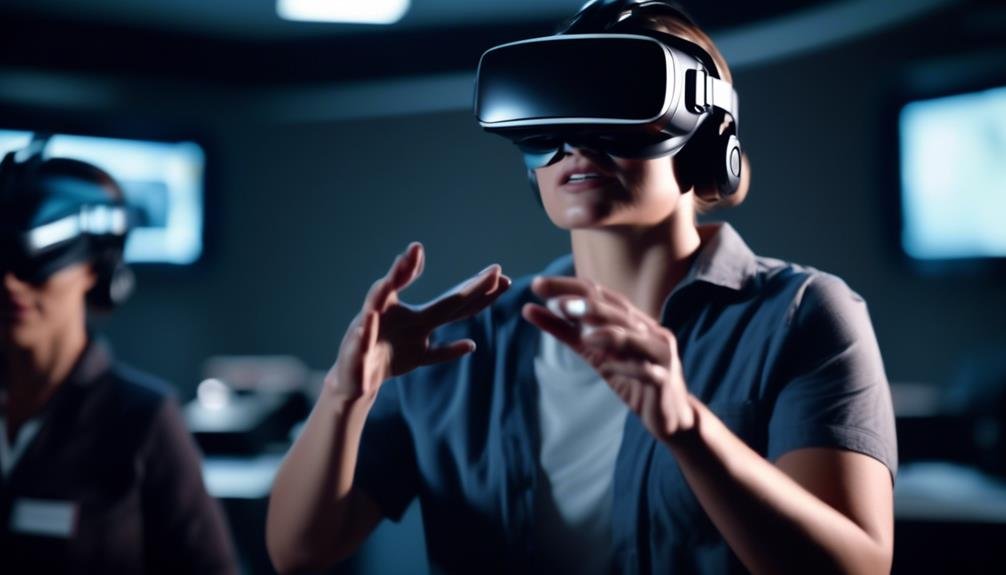Innovative Training Technologies Revolutionizing the Corporate World
The rapid evolution of technology has not only transformed the way we conduct business but has also revolutionized corporate training methodologies.
Innovative training technologies are reshaping the corporate world, introducing new dimensions to learning and development.
From virtual reality simulations that offer immersive experiential learning to artificial intelligence-driven personalized adaptive learning systems, the possibilities seem endless.
These advancements are not just limited to traditional classroom settings but are fundamentally altering the landscape of corporate training.
As organizations strive to stay competitive in an ever-changing business environment, the integration of these groundbreaking technologies is proving to be a game-changer in enhancing employee skills and performance.
Key Takeaways
- Immersive technologies like Virtual Reality (VR) and Augmented Reality (AR) are transforming corporate training by providing interactive and practical learning experiences.
- Personalization and customization through AI-driven systems enhance engagement and knowledge retention for individual employees.
- Technology-enabled learning platforms, such as VR and AR, enable scalable and engaging training across geographically dispersed teams.
- Incorporating mobile learning and gamification in corporate training enhances skill development and improves engagement and knowledge retention.
Virtual Reality in Training
Virtual Reality has emerged as a transformative tool in corporate training, offering immersive experiences and interactive simulations that enhance learning and skill development. This technology allows employees to engage in experiential learning, immersing themselves in realistic scenarios without real-world consequences. By simulating complex situations, such as high-stakes negotiations or emergency response protocols, VR enables employees to practice decision-making in a safe yet realistic environment.
The immersive nature of VR facilitates a deeper level of understanding and retention compared to traditional training methods, as it actively involves the learner in the learning process.
Furthermore, VR training can be customized to specific job roles, allowing employees to gain hands-on experience in their respective fields. This tailored approach not only enhances skills but also boosts confidence and proficiency. Additionally, VR training can be easily scaled and deployed across geographically dispersed teams, ensuring consistency in learning outcomes.
Augmented Reality Applications
Augmented Reality technology is rapidly transforming the landscape of corporate training, offering innovative ways to enhance employee learning and development. AR training simulations provide hands-on learning experiences that allow employees to interact with virtual objects in real-world scenarios, facilitating practical skill development. By immersing employees in lifelike simulations, AR enables them to apply theoretical knowledge in a realistic context, leading to a deeper understanding of complex concepts.
Furthermore, AR-based performance assessment tools offer a novel approach to evaluating employee proficiency. These tools enable real-time feedback and performance tracking, allowing for personalized learning pathways tailored to individual needs. Through AR, employees can receive immediate guidance on their tasks, leading to continuous improvement and skill enhancement.
The integration of Augmented Reality applications into corporate training programs signifies a shift towards experiential learning, fostering a more engaging and effective training environment. As AR continues to advance, its potential to revolutionize the way employees are trained and assessed is undeniable, making it a valuable asset in the corporate world's pursuit of continuous learning and development.
Artificial Intelligence Integration
The evolution of training technologies in the corporate world extends beyond Augmented Reality applications, as the integration of Artificial Intelligence (AI) is revolutionizing the landscape of employee learning and development. AI-driven personalization is at the forefront of this transformation, allowing for tailored learning experiences that cater to the specific needs and learning styles of individual employees. This level of personalization enhances engagement and knowledge retention, ultimately leading to more effective training outcomes.
Moreover, the integration of virtual assistants powered by AI further enhances the learning experience for employees. These virtual assistants can provide on-demand support, answer questions, and guide employees through various training modules. By leveraging natural language processing and machine learning, virtual assistants can understand and respond to employee queries, creating a more interactive and responsive training environment.
Interactive Online Platforms
As the corporate landscape continues to evolve, interactive online platforms have emerged as a pivotal tool for training and development.
Engaging virtual simulations offer employees the opportunity to apply theoretical knowledge in a practical, risk-free environment.
Real-time virtual collaboration fosters seamless communication and knowledge sharing, while personalized interactive learning ensures that employees receive tailored training experiences that cater to their individual needs and learning styles.
Engaging Virtual Simulations
Engaging virtual simulations through interactive online platforms have emerged as a pivotal tool in revolutionizing corporate training methodologies. These simulations offer an immersive experience, allowing employees to interact with real-life scenarios in a safe and controlled environment. This hands-on approach enhances skill mastery by providing a practical learning experience that traditional methods often lack.
Through interactive online platforms, employees can engage in realistic simulations that mimic their actual work environment, enabling them to apply knowledge and problem-solving skills in a risk-free setting. This not only boosts confidence but also accelerates the learning process, resulting in better-prepared and more competent employees.
As technology continues to advance, the integration of engaging virtual simulations into corporate training programs is becoming increasingly essential for organizations aiming to stay ahead in today's competitive business landscape.
Real-Time Virtual Collaboration
Real-time virtual collaboration through interactive online platforms represents the next frontier in immersive corporate training. It offers employees the opportunity to engage with real-life scenarios and actively apply their knowledge and skills in a dynamic, risk-free environment.
Virtual team building and remote collaboration have become increasingly vital as businesses embrace decentralized work environments. Interactive online platforms enable seamless communication, fostering real-time interactions among geographically dispersed teams. These platforms facilitate collaborative problem-solving, decision-making, and project management, enhancing productivity and innovation.
Through virtual collaboration, employees can participate in simulated exercises, workshops, and role-playing activities, promoting skill development and teamwork. Furthermore, these platforms provide a space for mentors and experts to engage with employees, offering guidance and feedback in real time.
As businesses continue to embrace remote work, real-time virtual collaboration is pivotal for driving organizational success.
Personalized Interactive Learning
Interactive online platforms have revolutionized personalized learning in the corporate world, providing tailored and engaging experiences for employees to enhance their skills and knowledge.
Through adaptive learning techniques, these platforms offer personalized coaching, allowing employees to progress at their own pace and focus on areas where they need the most improvement.
This individualized approach fosters a sense of ownership and empowerment, leading to increased motivation and satisfaction.
Moreover, the interactive nature of these platforms creates a dynamic and immersive learning environment, making the learning process more enjoyable and effective.
As a result, employees are more likely to retain information and apply new skills in their roles, ultimately contributing to the overall success of the organization.
Gamification for Learning
The incorporation of gamification as a learning tool has significantly transformed the way corporate training is approached, offering an innovative and effective method for engaging employees in skill development. Interactive gaming elements integrated into learning modules create immersive experiences, capturing the attention of employees and enhancing their learning retention.
Gamification leverages the natural competitive and achievement-oriented nature of individuals, providing a platform where employees can learn and apply new skills in a simulated yet realistic environment. This approach not only makes learning more enjoyable but also fosters a sense of accomplishment, driving motivation and active participation in training programs.
Furthermore, gamification for learning allows for real-time feedback and progress tracking, enabling organizations to identify areas for improvement and tailor learning experiences to individual needs. It also promotes teamwork and collaboration as employees can engage in friendly competition or work together towards common goals.
As a result, the use of gamification in corporate training has proven to be an effective strategy for fostering continuous learning and skill development within the workforce.
Mobile Learning Solutions
Mobile learning solutions have become increasingly integral in corporate training, offering flexibility and accessibility for employees to engage in continuous skill development. This shift towards mobile learning has been driven by the need for on-the-go learning that aligns with the fast-paced corporate environment.
The following factors highlight the impact of mobile learning solutions:
- Microlearning strategies: The incorporation of microlearning strategies in mobile platforms enables employees to access bite-sized, focused learning modules. This approach facilitates better information retention and application, leading to improved performance.
- Performance support tools: Mobile learning solutions provide performance support tools that offer quick access to information and resources at the point of need. This instant support enhances productivity and empowers employees to address challenges effectively.
- Blended learning approaches, Mobile assessment methods: The integration of blended learning approaches and mobile assessment methods ensures a well-rounded learning experience. It allows for a seamless combination of traditional and digital learning methods, while mobile assessment methods enable real-time evaluation and feedback.
The adoption of mobile learning solutions signifies a strategic investment in empowering employees with anytime, anywhere access to learning resources, ultimately driving organizational growth and success.
Personalized Adaptive Learning Systems
Personalized Adaptive Learning Systems are transforming the way employees learn and develop within the corporate environment. By offering customized learning paths, these systems enable individuals to focus on their specific needs and goals, leading to more efficient and effective skill acquisition.
Additionally, the real-time feedback provided by these systems allows for immediate adjustments and improvements, fostering continuous learning and growth.
Customized Learning Paths
In the ever-evolving landscape of corporate training, customized learning paths, also known as personalized adaptive learning systems, have emerged as a strategic solution to meet the diverse learning needs of employees.
These systems utilize adaptive learning technology to tailor learning experiences based on individual employee proficiency, preferences, and learning styles.
Personalized coaching is integrated to provide targeted support and guidance, fostering a sense of empowerment and motivation among employees.
The benefits of customized learning paths include increased engagement, improved knowledge retention, and enhanced skill development.
By offering employees the opportunity to chart their unique learning journeys, organizations can cultivate a culture of continuous improvement and individualized professional growth.
This approach not only enhances overall productivity but also contributes to a more fulfilling and satisfying work environment.
Real-time Feedback
Building on the foundation of customized learning paths, real-time feedback within personalized adaptive learning systems plays a pivotal role in providing timely and targeted support to employees based on their individual learning journeys and performance. This feedback mechanism enables continuous improvement by allowing employees to receive instant insights into their progress, identify areas for development, and adjust their learning approach in real-time. Performance evaluation becomes more effective as employees receive immediate feedback on their understanding of new concepts or skills, leading to a more efficient learning process. The table below illustrates the benefits of real-time feedback within personalized adaptive learning systems.
| Real-time Feedback Benefits |
|---|
| Timely Support |
| Targeted Insights |
| Performance Adjustment |
Conclusion
In conclusion, the incorporation of innovative training technologies is revolutionizing the corporate world by providing immersive, interactive, and personalized learning experiences for employees.
While some may argue that these technologies are costly to implement, the long-term benefits of improved employee performance, engagement, and retention outweigh the initial investment.
As organizations continue to embrace these advancements, they will undoubtedly see a significant impact on their overall success and competitiveness in the market.







